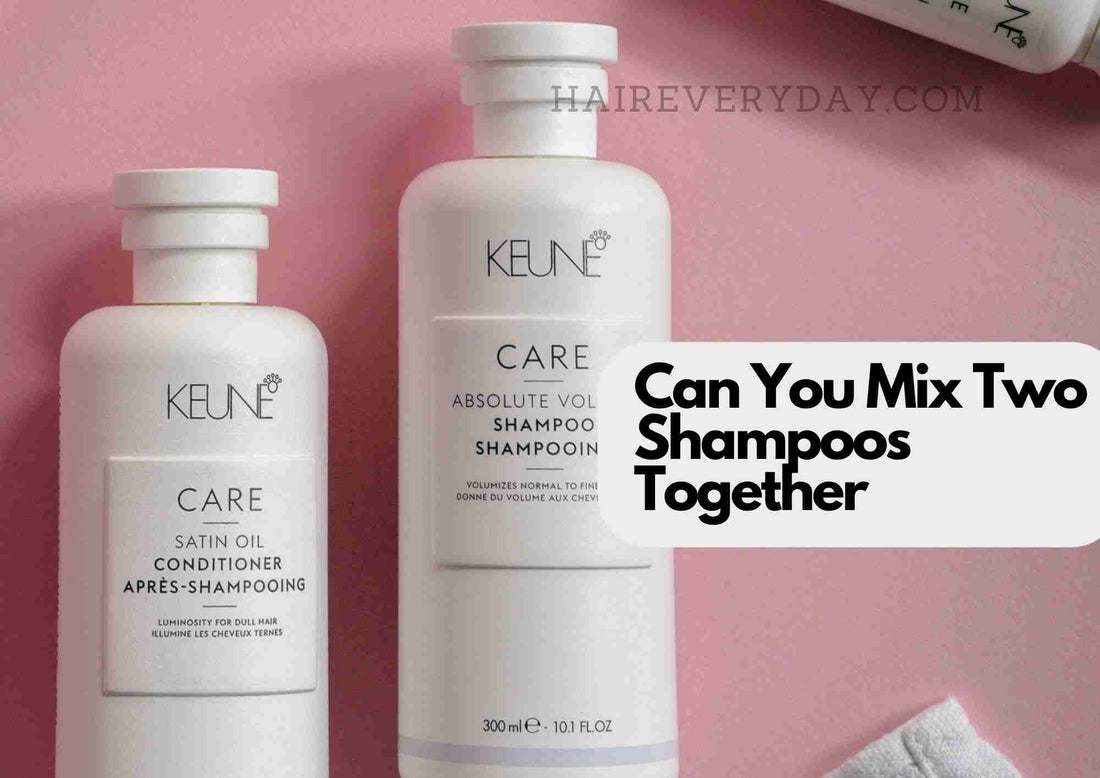If you’ve ever wondered “can I mix two shampoos together?” I have the answer here for you. Find out if the formulas change or if the ingredients of two shampoos can be enhanced by mixing them together.
In theory mixing two different shampoos together seems like an attractive option – not to mention potentially cost-saving. However, what are the implications of combining two formulas? It’s important to find out if this is a safe and useful practice before taking part.
This article will provide an overview on everything you need to know about the consequences of mixing two shampoos together.
Can I Mix Two Shampoos Together
- Mixing two shampoos together may seem like a good idea, especially if one shampoo bottle is nearly empty. It might look like a great way to get the best of both worlds and save a trip to your local store.
- But before reaching for a second bottle, it’s important to consider the potential repercussions.
- Most people don’t think twice about shampoo combinations, assuming that if the two shampoos have similar properties, they should mix fine. Unfortunately, this approach can lead to disastrous results.
- Each shampoo has been carefully formulated with specific ingredients, and when these two different formulas are combined, it can cause an interaction between them.
- Not only can this be damaging to your hair, but it can also cause an unpleasant, uncomfortable feeling too.
- The best way to avoid any unwanted consequences is to consult your dermatologist or hairstylist before mixing the shampoos. They will be able to tell you whether mixing the two products is safe or not.
- Additionally, it’s also worth taking a look at each product’s label and seeing what’s included. If the ingredients are too different, it’s probably best not to mix them.
Can You Mix Shampoo And Conditioner Together

The age-old question of whether or not you can mix two shampoos together generally sounds like a bit of a stretch – does it even make sense?
The answer is yes, you can mix shampoos and you can mix shampoo with a conditioner. But, should you?
Mixing two shampoos together can have several consequences – the shampoos may be too powerful and strip all the natural oils from your hair, leaving it limp, dry and unmanageable.
As the shampoos interact, there is also a chance that you could end up drying out your scalp and the results are anything but pleasant!
It’s generally a much safer option to stick to the same shampoo you’re already familiar with, rather than experimenting with different combinations.
If you have an issue with your hair texture then we would also suggest entirely different products as an alternative to mixing existing ones as they may not be compatible.
Conditioner is a whole different beast entirely – but again, not one that you would recommend mixing with your shampoo.
This is because shampoo and conditioner are two incredibly different products that are designed to help keep hair in different ways. Fusing them together dilutes their purpose and power, and could do more harm than good.
So, while the short answer to the question of whether you can mix two shampoos together is ‘yes’, the safer, more sensible approach is to stick to one shampoo and enjoy the unique benefits that the product is designed to provide.
Related: Can You Use A Curly Shampoo On Straight Hair
Can You Mix Dandruff Shampoo With Regular Shampoo

Mixing two shampoos together can seem like an enticing idea, but it might lead to more harm than good. Is it okay to mix dandruff shampoo with regular shampoo?
Before jumping straight in and creating your own unique shampoo mix, I recommend you consult a professional for advice about the impact such a concoction will have on your particular hair and scalp type.
Even if you think the combination could help your scalp and hair, it’s worth noting that the combination of two shampoos with potentially conflicting ingredients and properties is a risky move that could have unexpected or undesirable effects.
Dandruff shampoos are specifically created to target dandruff, and so this unique concoction may or may not be part of the control strategy your dermatologist or trichologist has chosen for you.
Also, it’s essential to consider the pH and possible interactions of the products. Mixing a neutral pH shampoo with an acidic one, for example, could reduce both the beauty and efficiency of the cleansing.
The same applies to mixing strong detergents such as sodium lauryl sulfate with milder ones, as it could lead to scalp damage, dryness, and other undesired effects.
In terms of the therapeutic power of combining dandruff and regular shampoos, it may help to fight dandruff better, but, again, only your doctor can tell you definitively.
Mixing two shampoos is not a generic treatment and the possible risks could be significant.
The bottom line is: combining two of these products is a gamble that may or may not pay off, so proceed with caution.
Related: How Often Should I Change My Shampoo
Is It Bad To Use Two Different Shampoos At The Same Time
Mixing two shampoos together may seem like a good idea, however mixing different types of shampoos poses its own unique set of risks.
While using two shampoos might make your hair feel soft and get rid of any build up, it could be pulling apart the delicate balance of a healthy scalp. Like any other product, shampoos have a certain pH balance that shouldn’t be messed with.
When it comes to shampoo, there’s no one-size-fits-all formula. Different hair types need different formulas, so double dosing yourself on different shampoos might just be counteracting each other’s effects.
Shampoos meant to be nourishing could be undone by the solution of spraying on a clarifying shampoo. Using two shampoos at the same time could also lead to a complete lack of results.
By using two different shampoos, you could be making your hair product less effective.
In addition, both shampoos could lead to scalp irritation. While one shampoo formula might be okay for your scalp, two shampoos could be too much for your scalp if the pH balance between the two are too different.
This could cause dandruff, an itchy scalp, and even hair loss. While hair loss from dying your hair is more of a long term problem, mixing two shampoos could lead to an immediate issue.
In short, it’s not recommended to mix two shampoos at the same time. If you want to give your scalp an extra scrub or boost of nutrients, there are other options that don’t pose the same risks as using two different shampoos.
Check with your hairstylist or dermatologist to find out what the best option would be for your hair type and scalp health.
Some Hair Products That You Shouldn’t Mix
As someone who has experimented with different hair products, I can tell you that not all shampoos and conditioners play well together. Mixing certain hair products can lead to disastrous results, including dryness, breakage, and even hair loss. Here are some hair products that you should avoid mixing:
- Clarifying Shampoo and Color-Treated Shampoo: Clarifying shampoos are great for removing buildup from your hair, but they can also strip away color. If you have color-treated hair, it’s best to stick with a shampoo specifically designed for colored hair.
- Anti-Dandruff Shampoo and Color-Treated Shampoo: Anti-dandruff shampoos can be harsh on color-treated hair and cause it to fade faster. If you have dandruff and color-treated hair, look for a gentle anti-dandruff shampoo that won’t strip away your color.
- Medicated Shampoo and Conditioner: Medicated shampoos are designed to treat scalp conditions like psoriasis and seborrheic dermatitis. However, using a medicated shampoo with a regular conditioner can reduce the effectiveness of the medication. If you need to use a medicated shampoo, look for a matching medicated conditioner.
- Protein-Based Shampoo and Conditioner: Protein-based shampoos and conditioners are great for strengthening and repairing damaged hair. However, using too much protein can actually make your hair brittle and prone to breakage. If you’re using a protein-based shampoo, make sure to follow up with a moisturizing conditioner to balance out the protein.
By being mindful of the hair products you’re mixing, you can avoid damaging your hair and keep it looking healthy and beautiful.
Top 2-In-1 Products That You Can Use (Instead Of Mixing Shampoos)
As someone who has tried mixing shampoos in the past, I can tell you that it can be hit or miss. Sometimes the combination works, but more often than not, it leaves your hair feeling greasy or weighed down. Instead of playing shampoo mixologist, consider trying out some 2-in-1 products that are specifically designed to clean and condition your hair in one go.
Here are two top 2-in-1 products that I recommend:
1. Pantene Pro-V Daily Moisture Renewal 2-in-1 Shampoo and Conditioner
This product is great for those with dry or damaged hair. The formula contains Pro-Vitamin B5 and helps to nourish and moisturize your hair, leaving it soft and shiny. Plus, it’s affordable and widely available at most drugstores.
2. Head & Shoulders Clinical Strength 2-in-1 Anti-Dandruff Shampoo and Conditioner
If you suffer from dandruff, this 2-in-1 product is a game-changer. It contains pyrithione zinc, which helps to fight flakes and soothe your scalp. Plus, it leaves your hair feeling clean and conditioned.
Using a 2-in-1 product can save you time and money, and it eliminates the need to mix and match different shampoos and conditioners. Give one of these products a try and see if it works for you!
Why You Should Trust Haireveryday?
The author of this article, Leah Marie Priest has a degree in Cosmetology with years of experience in dealing with hair care, scalp care, and hairstyling. As someone who extensively deals with all kinds of hair textures, products, styling methods and more, hair Leah Marie knows what kind of products and procedures suit each hair type and person. We have also tested these hair products and processes ourselves to provide you an unbiased review about every product. Each of our articles are also reviewed by a team of medical professionals so that you get the most accurate and expert-reviewed information.
Conclusion
In conclusion, mixing two shampoos together may be something you’ve considered at least once while looking for the perfect daily hair care routine.
While the specifics of this method have not been proven, it is commonly believed that mixing two shampoos may yield beneficial results.
Whether it be for cost savings, to create the perfect mix of moisturizing and cleansing properties, or just for the fun of it, feel free to experiment and see how it works for you!
Also Read:
How To Check If Shampoo Is Sulfate-Free
To Summarize

